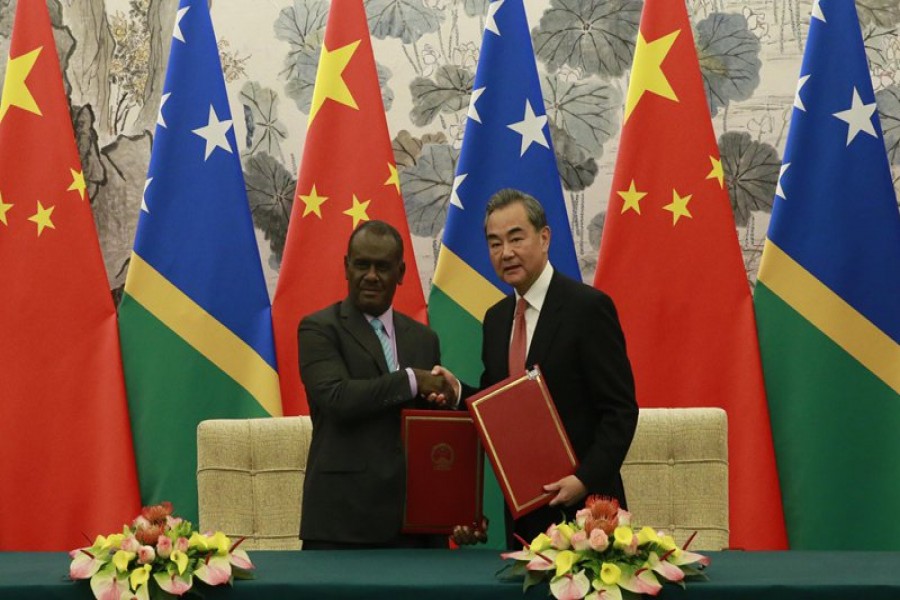After severing ties with China's island of Taiwan earlier this week, Solomon Islands established formally diplomatic relations with the Chinese mainland in Beijing on Saturday, a decision that acknowledges the unequivocal one-China principle
The country, among 14 pacific countries with a total population of about 627,000, announced to cut the "diplomatic ties" with the island of Taiwan on Monday, a decision to acknowledge the one-China principle.
Chinese Sate Councilor and Foreign Minister Wang Yi and Solomon Islands Foreign Minister Jeremiah Manele signed a joint communiqué during the ceremony of the formal establishment of bilateral relations the two nations that marked the formal establishment of diplomatic ties.
"Solomon Islands acknowledges one-China principle, and the island of Taiwan is an inseparable part of China; China highly praises the stance of Solomon Islands," Wang said, noting that the history will tell the fundamental and long-term interests of this decision to the people of the Solomon Islands.
"China won't seek unilateral interest, and our cooperation with Solomon Island will be equal, open, reciprocal," the Chinese Foreign Minister added.
Manele noted during the ceremony that the decision of establishing formal diplomatic relations with China is based on the country's national interests, and Solomon Islands needs a broad partnership. "And now we are ready to begin a new era of relations with China," he said.
Taiwan, under international law, is not entitled to diplomatic relations with any sovereign country in the world because it is not recognized as a country by the United Nations, Solomon Islands Prime Minister Manasseh Sogavare said in a statement on Friday. "Our sovereign decision to sever diplomatic relations is therefore consistent with international law," he added.
Amid resounding praises from China, the Solomon Islands' decision was followed by Kiribati, another pacific island, which broke ties with the island of Taiwan on Friday. According to analysts this will accelerate the pace of more countries establishing diplomatic ties with the mainland and acknowledging one-China principle is an irreversible trend in the global community.
"Establishing diplomatic ties with the mainland will also stimulate those in the Pacific that still maintain 'diplomatic relations' with Taiwan island, which may lead to a 'domino effect' among them," Xie Bohua, former Chinese ambassador to Vanuatu, told the Global Times on Saturday.
Two countries severing ties with the island of Taiwan in a week is also seen as "a major blow" to Taiwan regional leader Tsai Ing-wen's office, as many observers and politicians have been questioning Tsai's policies and her competency to maintain a healthy cross-strait relation as well as maintaining the stability of Taiwan's external affairs.
Taiwan's 'diplomatic unrest'
Since Tsai took the office in 2016, growing number of countries including severed ties with Taiwan, setting a new record as the regional leader who saw the highest number of countries ending "diplomatic relations" with the island.
Sogavare said in the statement that over past years, Solomon Islands would encourage more business from Taiwan to invest in the country, however, they have not been actively doing so, and their investments have been in political interests.
Meanwhile, the Solomon Islands cutting ties with Taiwan also reflects its long-term development interests rather than being uncertain over what might happen after reunification of Taiwan with mainland one day, the prime minister said.
"People in Taiwan would raise more doubts on the Tsai's office, as her policies to confront the mainland with the help of the US could not stop countries from forging ties with the mainland," Jin Yi, a research fellow at the Institute of Taiwan Studies of the Chinese Academy of Social Sciences, told the Global Times on Saturday.
The way of confronting the mainland, from political to economic to cultural, will all end in vain, and people will be aware of this trend, he noted.
Since Tsai assumed office in 2016, the number of countries severing ties with the island of Taiwan has been growing at large.
Sogavare said in the statement that over the past many years theSolomon Islands has encouraged more business from Taiwan to invest in the country; however, they have not been actively doing so, and their investments have been in political interests.
Meanwhile, the Solomon Islands cutting ties with Taiwan also reflects its long-term development goals rather than reeling in uncertainty about the possible overcomes after the reunification of the island of Taiwan with the mainland, the prime minister noted.
"People in the island of Taiwan would raise more doubts on Tsai's office, as her policies to confront the mainland with the help of the US could not stop countries from forging ties with the mainland," Jin Yi, a research fellow at the Institute of Taiwan Studies of the Chinese Academy of Social Sciences, told the Global Times on Saturday.
The mannerism of confronting the mainland, from political to economic to cultural, will all end in vain, and people will be aware of this trend, he noted.
Bright future
After formally establishing diplomatic ties, the Solomon Islands and China will see closer political and economic cooperation, which will also benefit the regional development of the entire Pacific Island,officials and observers said.
Even prior to the establishment of official diplomatic relations, China was the largest export destination for the Solomon Islands with 65.2 percent of the country's merchandise exported to China in 2017, according to the official statistics. Now, deepened ties will offer greater business and growth opportunities to the Pacific Island country, which will help create more development synergies in the region.
In 2018, China-Solomon Island reached a total volume of 2 billion Solomon Island dollars ($242 million), with China being the largest single trading partner surpassing other partners of the Soloman Islands in total trade volume.


